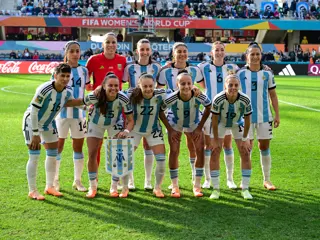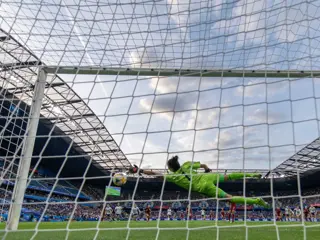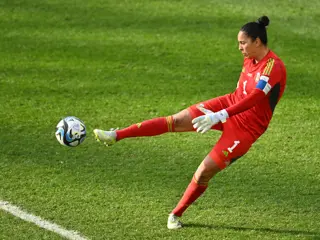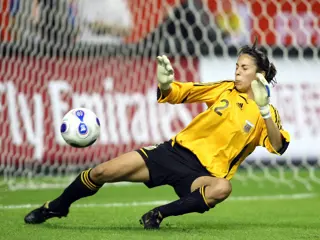Player Story
Vanina Correa: "World Cup prize money a step forward for what we want to achieve"

To mark one year since the 2023 Women’s World Cup, players around the globe are detailing how improved conditions and prize money at the tournament changed women’s international football, and why players and unions should push for equality at the 2027 Women’s World Cup. Vanina Correa, Argentina's 2023 captain and four-time World Cup participant, shares her thoughts.
By Vanina Correa
A World Cup for me is everything. It represents work, effort, sacrifice. I was lucky enough to be at four World Cups. It wasn’t just a personal effort, though. I have two 10-year-old children, my twins Romeo and Luna, and for them it was also demanding because I dedicated so much to football that I didn’t spend much time at home with them.
We keep memories on the walls of our home. I have framed in a picture the gloves from the day that, just a couple of weeks shy of my 40th birthday, I played my last World Cup match against Sweden. I also kept a souvenir of a match that marked a before and after for me: the jersey from the afternoon against England at France 2019, when I saved a penalty and was voted player of the match. I wanted to wash it and they wouldn't let me! It's hanging, in the same condition as I wore it that day.
My first World Cup was in 2003. Back then, we didn't take note of what player conditions were like at the tournament because they were simply better than the ones we had playing in Argentina. So, being in a World Cup, everything seemed impressive. Everything was new. That meant that we didn't see the things that might have been missing.
From that tournament over 20 years ago in the United States to last year’s in Australia and New Zealand, player conditions have improved immensely. At France 2019, a very special World Cup for us when we returned to play after a 12-year absence, we lived a great experience: we travelled first class from Buenos Aires to Europe, we enjoyed good pitches, good hotels, good food. France was great, but the conditions we had in Australia and New Zealand were even better.
To begin with, the flight from Argentina to New Zealand is a very long one. I had to make a similar trip once before and when you travel economy class, you arrive feeling destroyed. I'm big, 1.80m tall, and you can really feel the difference of travelling comfortably in first class when being able to stretch your legs.
When I was there, there were several things that surprised me a lot with the facilities. We were always able to rest perfectly in the places we went to, the changing rooms were comfortable, and the pitches we trained on were very good. It's important to have a suitable training base because when you have so little recovery time between matches, combined with a pitch that is not in good condition, it can create difficulties for players in terms of injuries. You are more prone to injury if the pitch is not good.
Another thing I remember fondly is the internal travel we had to do. We played only in New Zealand but in three different cities: Auckland, Hamilton and Dunedin. Every time we had to change venues, we did it very comfortably. There are times when those moves can be complicated, but everything was first class. The only thing I suffered with was the cold!
As for the increased player prize money, the exchange restrictions that exist in Argentina meant that what we won was devalued quite a lot, but it is money that we received and that adds up for us. In football here in Argentina there are still very low salaries, as is the case in South America in general. So by receiving this prize money, a player can have the peace of mind of being able to sustain herself a little over time, of not being so tightly squeezed. It was like a breath of fresh air for us.
Apart from what happened to us with the amount, related to government decisions in our country, the fact that FIFA gave us a guaranteed sum just for participating in a Women's World Cup was a step forward knowing that the development of football in some countries today is below par.
I say that it is not an achievement, but rather a step forward for what we want to achieve. We have to keep taking small steps in women's football to get it to where it needs to be. Large strides are perhaps counterproductive at this stage, but continuous steps are necessary for it to continue to grow.
A great starting point was getting together in 2022 and making the same demand to improve conditions, knowing that national teams shared the same thought of wanting to elevate women's football. That union is always strong and has been very important.
There are players who have better conditions than we have on this side of the world, but that doesn't mean they look the other way. They are always with us. The fact that top-level players call you to sit down and talk about improving conditions creates an atmosphere and a lot of positive things to keep working on.
I always talk about the development of women's football and that development should be centred around the next generation. Maybe we, the older ones, gave a little push, we put our faces and our chests out there, but the real development is in the youth teams. That is where the associations must aim to bolster their national teams and clubs.
A great starting point was getting together in 2022 and making the same demand to improve conditions, knowing that national teams shared the same thought of wanting to elevate women's football.
I understand that each association has a different economic reality, but in South America for example, there are countries that don't qualify for the World Cup and don't compete for four years. When that is the case, how do you even have a chance of qualifying for a World Cup? And the development of football in that country becomes even more delayed as a result. In that sense, we need to dedicate more resources to development so that it is on a more equal footing with the powers that be.
The truth is that I won't see that growth as a player. I retired from professional football a few weeks ago. It was something I had been working on, thinking about. At times it's difficult. After so many years of having a routine, you feel a bit of an emptiness. But I dedicate a lot of time to my children – I'm busy all day! They go to school, we take them to an English course, they have football and hockey....
I am at peace with the decision. I wanted to bow out competing. I didn't want them to open the door and push me out. For a long time I worked on retirement in my head, to leave on my own terms. And this was the best time.




